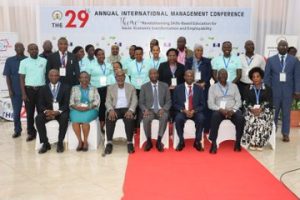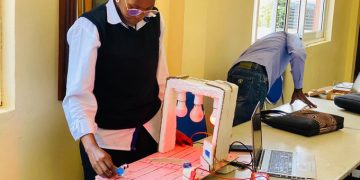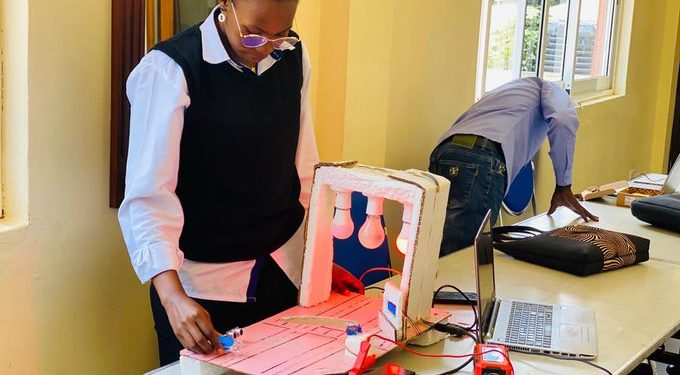Entebbe – Students from Makerere University Business School (MUBS) demonstrated cutting-edge innovations at the 29th Annual International Management Conference (AIMC) held at Imperial Golf View Hotel, highlighting the institution’s commitment to producing graduates who are ready to solve real-world problems.
The conference, attended by academics, industry experts, and policymakers, served as a platform to showcase student projects addressing critical societal challenges using technology and innovative thinking. Among the standout projects was Matovu Mathew Phillip’s Automated Car Parking System, designed to reduce congestion and inefficiency in parking spaces through artificial intelligence and IoT technologies.
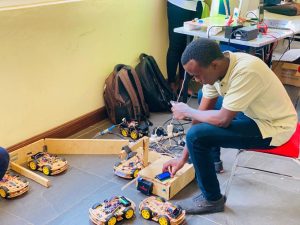
Opio Emmanuel presented an Accident Detection and Alert System, which aims to provide rapid emergency response in the event of accidents, particularly in remote areas. “This project helps to solve delayed response in emergency periods when accidents occur and saves lives that could otherwise be lost,” Emmanuel explained.
Another notable innovation was Akankunda Lonitah’s Automated Traffic Lights System, intended to reduce congestion and delays at busy junctions. Each of these projects reflected the conference theme of bridging academia with practical solutions for societal development.
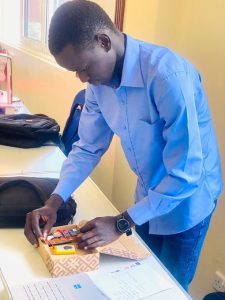
During his opening remarks, MUBS Principal Prof Stephen Muhwezi emphasised the role of business education in fostering practical skills. “The goal of MUBS as a business institution is to produce graduates who are capable of creating opportunities and contributing meaningfully to society. We have been providing skills-based education in ICT, business communication, entrepreneurship, and problem-solving as key strategies to embed essential skills in our curriculum.”
Prof Muhwezi further highlighted the importance of leveraging research outputs for economic impact. “Makerere produces over 2,000 research articles annually, particularly in the health sector. If fully utilised by policymakers, these outputs could lead to meaningful societal change. We need to develop more effective ways to disseminate our research rather than confining it to libraries,” he said during the Business Forum at AIMC.
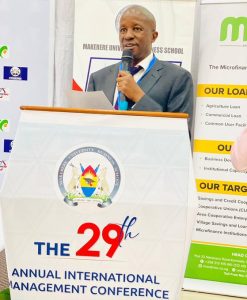
The conference also included sessions on scholarly publishing and employability. Prof Nixon Kamukama Arinaitwe, Deputy Vice-Chancellor of Academic Affairs at Mbarara University of Science and Technology, delivered a keynote on the unwritten rules of scholarly publishing, emphasising strategies for transforming rejection into recognition.
“The unspoken rules involve knowing your audience, selecting the right journal, timing your submission, networking, collaborating, observing peer reviews, and citing strategically yet ethically,” Prof Kamukama noted.
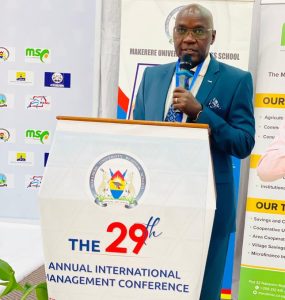
Echoing the need for student preparedness, Prof. Samuel Sejjaka advised, “PhD students and researchers need to be widely informed and become the first critics of their work,” underscoring the importance of self-evaluation in academic growth.
Dr Safiina Kisu Musene, Director of Technical and Vocational Education and Training (TVET), addressed gaps in workforce readiness. “Despite Uganda’s large pool of graduates, employers struggle to find employees with the right blend of digital, adaptability, and innovative skills. This gap has led to reduced innovation, higher employee turnover, and increased operational costs,” she said.
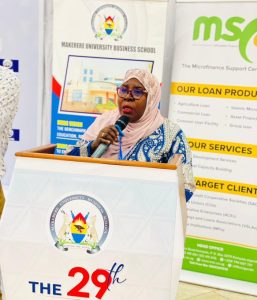
Dr Musene urged co-creation of curricula with industry input to ensure graduates acquire relevant skills. “We need modern training infrastructure, joint investments in engineering labs, ICT hubs, and health simulation centres to provide students with exposure to real-world technologies,” she added.
The conference also focused on Africa’s future workforce and employability. Mr Ernest Rubondo, Executive Director at the Petroleum Authority of Uganda, addressed the challenges in the oil and gas sector. His expertise in the sector is well-established, having received the SPE Africa Regional Director Special Award for his contributions to the Society of Petroleum Engineers and the advancement of the oil and gas sector in Africa.
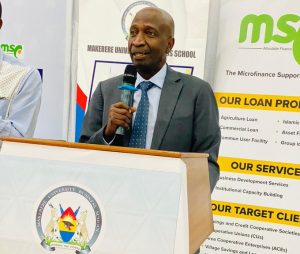
“With about 800,000 young Ugandans joining the workforce annually, a severe skills gap leaves many either unemployed or underemployed, echoing a wide African challenge. Bridging this gap requires reorienting skills, investing in digital infrastructure, and fostering innovations,” said Betty Jackie Namubiru, Manager for National Content at PAU, highlighting the relevance of industry-academia collaboration.
Dr Mercy Kainobwisho, Registrar General of URSB, praised the conference for its practical impact. “This platform is timely as it is intended to bridge the gap between academia and the market, enabling us to move beyond theoretical knowledge and apply it in practical, meaningful ways that benefit people,” she said.
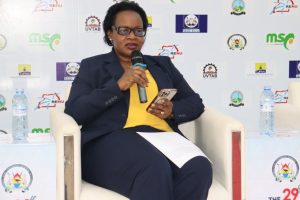
The 29th AIMC underscored MUBS’ mission to cultivate graduates who not only excel academically but also contribute to Uganda’s socio-economic development through innovation, research, and entrepreneurship. The event successfully combined academic discourse with practical demonstrations, reinforcing the value of equipping students with both theoretical knowledge and applied skills to tackle contemporary challenges.
